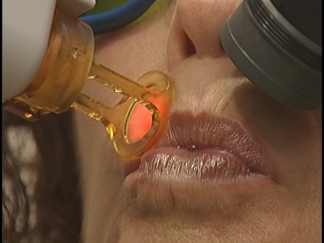
Since I work for a skincare company, I have to bring you information to help you prevent future damage. Those nasty "wrinkles." If you care read it, and if you don't just skip it!
Blame sun and smoking for early wrinkles. What will erase these marks of time?
April 24, 2006 - Every woman dreads the day when she glimpses the first wrinkle in her otherwise smooth skin. But for many, that day is arriving even earlier than they expected. Dermatologists say that the increasing popularity of tanning beds and smoking among young women over the last two decades has spawned a generation with premature wrinkles or worse. "We're seeing many more women with sun damage at earlier ages today," says Dr. Roy Geronemus, a New York dermatologist. And, he adds, "the number of young women with skin cancer is startling."
Sun and cigarettes in adolescence and early adulthood are also the culprits behind age spots, broken blood vessels and irregular pigmentation by the time you're in your 30s. Dodging those two is the best way to keep skin looking young as long as possible. But if the damage is done, don't lose hope. Going under the knife isn't the only option. Even though you can't completely erase the effects of aging and unhealthy habits, you can take advantage of a growing array of skin-care products that may help hide these flaws—from $20 drugstore wrinkle remedies to laser procedures that can cost hundreds of dollars.
Much of the billions spent annually to fight skin damage is going toward a category of products called cosmeceuticals—over-the-counter preparations that are neither cosmetics nor pharmaceuticals and thus are largely unregulated. In 2004, estimated U.S. sales of skin-care cosmeceuticals reached $6.4 billion; analysts say the figure is expected to grow with the market. What can you expect from these and other skin-care products? Here's a rundown of advice from the experts:
SUNBLOCK: It seems obvious, but dermatologists say many people still wrongly assume that sun protection is required only for a day at the pool or beach. In fact, you need it every day. "When you're walking your dog, or even sitting next to a window for a long time, you're getting incidental sun exposure—and over time, that adds up to sun damage," says Dr. Diane Berson, assistant professor of dermatology at Cornell University's medical school. Pay attention to the sun-protection factor (SPF). While lotion with an SPF of 15 blocks about 96 percent of the sun's rays, a 45 SPF sunblock cuts out about 99 percent. That can make a big difference to someone who's fair-skinned. Wonder what your skin would look like if you'd kept it protected from the sun? "Look at your butt," says Dr. Steven Cohen, chief of the dermatology department at Montefiore Medical Center in New York. "It's smooth, without wrinkles."
MOISTURIZERS: Besides causing wrinkles and other damage, aging and sun exposure can exacerbate dry skin. Experts recommend regular use of a moisturizer once a woman is in her late 20s or 30s to smooth and soften skin. Look for ingredients like petrolatum, glycerin, hyaluronic acid and cyclomethicone—all of which help prevent water loss from your skin. Cohen prefers Vaseline Petroleum Jelly Cream, a nongreasy formulation. He recommends avoiding hot or frequent showers (which can remove the body's natural oils) and disinfectant soaps, which can be abrasive.
WRINKLE ERASERS: Antioxidants like topical vitamin C or E neutralize free radicals (unstable oxygen molecules that break down skin cells, damage DNA and exacerbate wrinkles) and can improve the skin's appearance and protect it from sun damage. Retinoids (vitamin A derivatives) help remove dead cells for smoother skin, stimulate collagen production to ease wrinkles, and even out skin tone. Renova and Avage, available by prescription, are the only such products approved by the Food and Drug Administration to treat wrinkles. But brands with similar but milder ingredients like retinol are available over the counter. These include Neutrogena Healthy Skin Anti-Wrinkle Cream, RoC Retinol Correxion creams and L'Oréal Line Eraser.
Alpha hydroxy acids work in a simi-lar fashion, removing the top layer of cells and stimulating collagen production to smooth skin. They're generally less irritating than topical antioxidants but don't penetrate the skin as deeply. "They may not have as dramatic an impact on how the skin behaves, but they're great for a Band-Aid refresher look," says Dr. Richard Glogau, a San Francisco dermatologist.
Peptide products may also minimize wrinkles by stimulating collagen production. Dermatologists cite brands like StriVectin, Olay Regenerist Daily Regenerating Serum and Estée Lauder Perfectionist. But they stress that, as with other cosmeceuticals, data on the effects of these products are limited, as clinical trials are not required.
ACNE TREATMENTS: Topical retinoids calm down breakouts of adult acne, which can be triggered by stress and hormonal fluctuations in those genetically prone to pimples. Topical antimicrobials, like benzoyl peroxide, and antibiotics are other options; a dermatologist can help you decide what would work best for you.
SPOT REMOVERS: To specifically target "sun spots" and even out skin color, dermatologists recommend products with hydroquinone, which gradually bleaches the skin. Side effects include redness and irritation. Avoid these products if you're pregnant because they can hurt a developing fetus.
DERMABRASION AND LASERS: For more-dramatic results, you'll need to see a dermatologist. One of the most popular procedures, microdermabrasion, essentially sands off the skin's surface to remove dead cells. The treatments, which start at about $200 per session, often need to be repeated several times for noticeable and lasting results.
Laser skin resurfacing can also minimize fine lines, especially around the mouth and eyes, and treat uneven pigmentation. It can cost hundreds of dollars per session, and usually require return visits. Long-term studies of safety and effectiveness aren't yet available.
One more point: you're never too old to protect your skin. You may feel like giving up when you see the consequences of teenage tans in your mirror, but that's no excuse for skipping daily sunblock, says Dr. Alysa Herman, a Miami dermatologist. Sun damage is cumulative—and that means every day's rays do a little more harm. If you're still craving that golden tan, try spray bronzers. You'll get the same glow, but without the guilt.







































